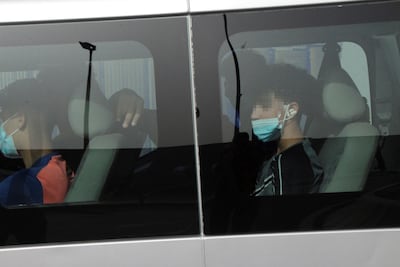A judge in the Spanish enclave of Ceuta has put the forced deportation of minors to Morocco on hold.
Human rights groups had issued an urgent appeal to protect unaccompanied children in the city, an autonomous territory in mainland North Africa.
The Spanish government came under fire after it started to expel Moroccan minors from Ceuta last week. Lawyers declared the move “completely illegal”.
“Unaccompanied minors have rights and the state has failed to act in their best interests which it is meant to do through an evaluation which then determines whether these children should be integrated, relocated or returned,” Carmela de Menta, childhood policy manager at Save the Children in Spain, told The National.
Up to 10,000 migrants – about 3,000 of them minors – gained entry to Ceuta during a period of several days in May, owing to lax border controls.
Several human rights organisations, including the UN children’s agency, Unicef, had urged Spain to halt the repatriation of hundreds of the minors who were not accompanied by adults.
Save the Children
At the time, most children were sent back immediately in “express deportations”. But for the past three months, about 200 children have been living on the streets in Ceuta and 740 in emergency shelters in which some were interviewed by Save the Children.
A quarter of the children who spoke to the charity had fled violence in Morocco and one in six was a victim of torture.
Ms Menta told The National that Save the Children had begun to hear rumours about potential expulsions last week. It then learnt that a minivan carrying 15 children had left for the Moroccan border on Friday.
This had occurred immediately after an agreement was reached between the Spanish and Moroccan governments to deport the 740 Moroccan minors who were under state care.
“There wasn’t any transparency around the process. We don’t know why these children were chosen or whether the appropriate assessments were done,” Ms Menta said.

Under the UN Convention on the Rights of the Child, all minors – defined as anyone under the age of 18 – have the right to be heard during all legal and administrative processes that may affect them. Spain’s own immigration law requires that protection services and the public prosecutor issue a report before any minor is deported. For the 740 children in the Ceuta shelter, this process was not followed.
“The legislation is very clear on this subject,” Carmen Molina, the head of children’s policy at Unicef, told the Spanish daily newspaper El Pais.
“It’s incredible to us that this is happening, when we understand that they are carrying out evaluations of the minors’ general interest and that they are not finished.”
Since Friday’s agreement, a van full of children had been sent across the border every day. But Monday’s court ruling has put this process on hold.
Save the Children said 52 children had already been returned to Morocco and others had disappeared from its shelter.
Last week, Unicef called the forcible deportations an “unpleasant surprise” that contravened both international and national law.
It welcomed the judge’s new ruling, posting on Twitter: “The discontinuation of the returns of minors in Ceuta confirms that the Spanish justice is firm in the defence of Human Rights and in the protection of migrant children.”
Save the Children told The National its priority was to reach the remaining children still in the detention centres and let them know they had the right to legal representation.


